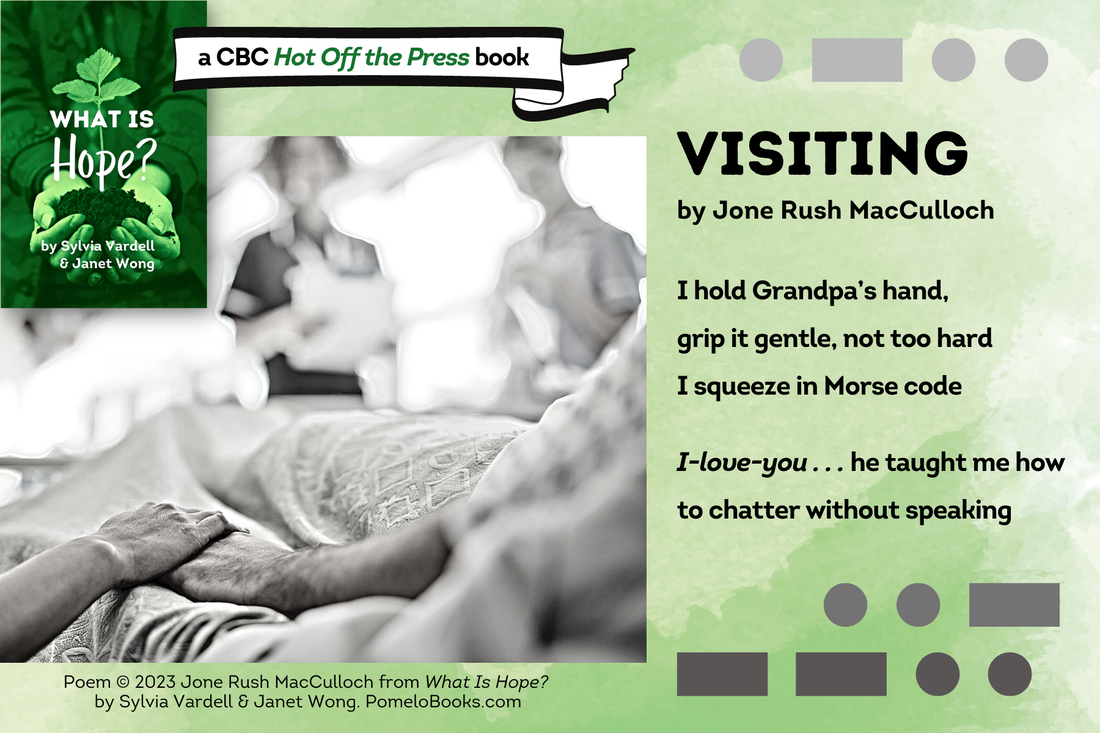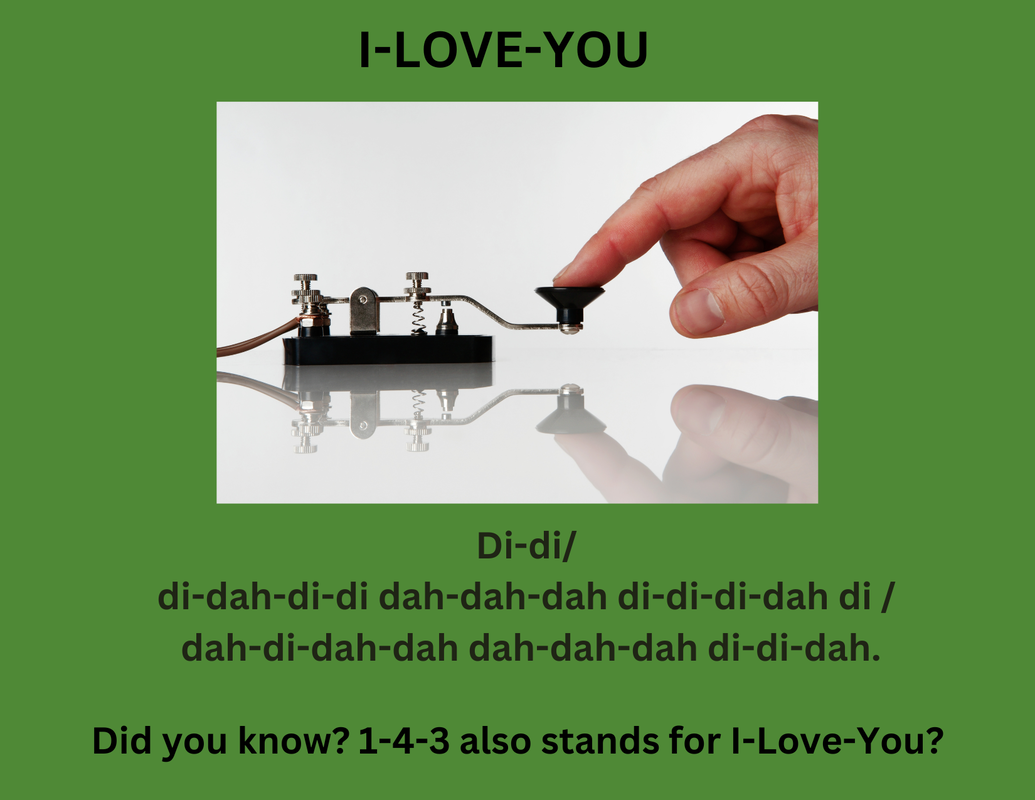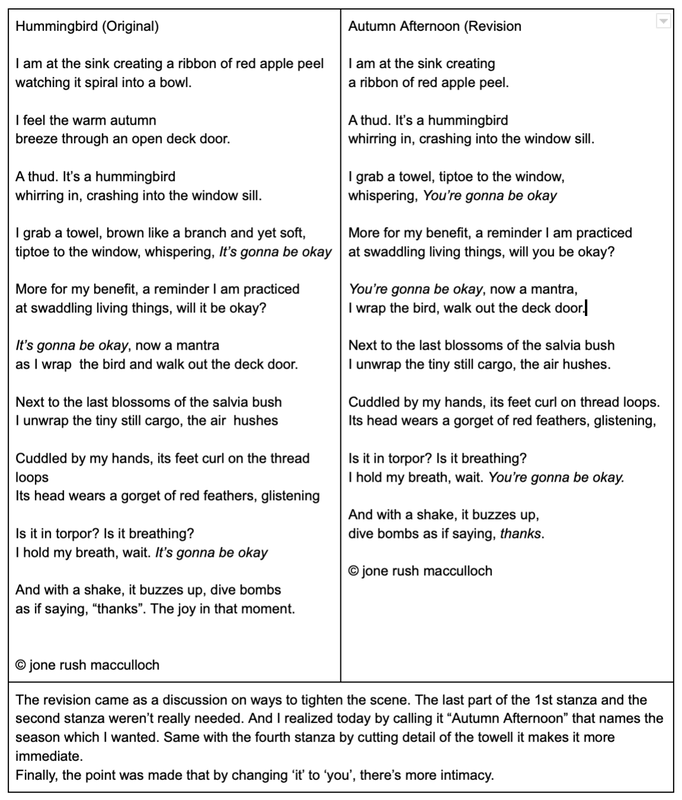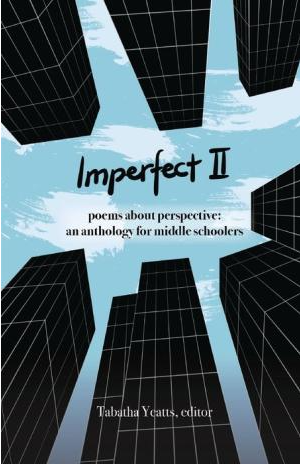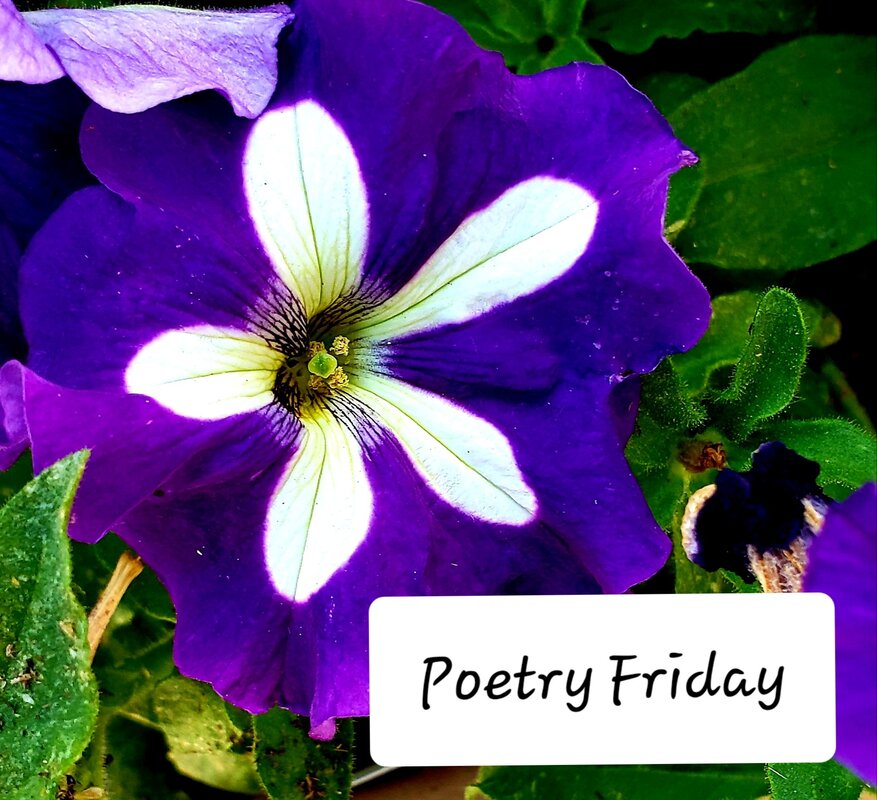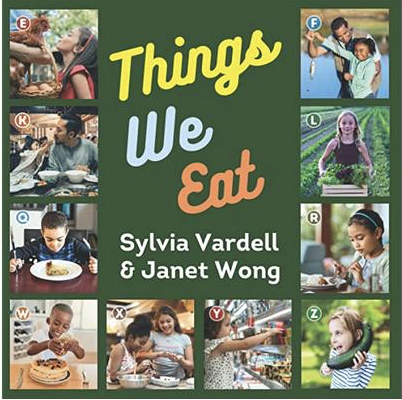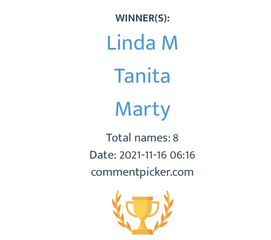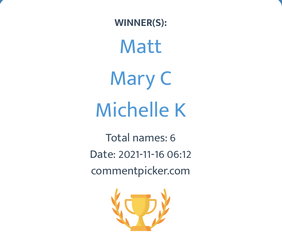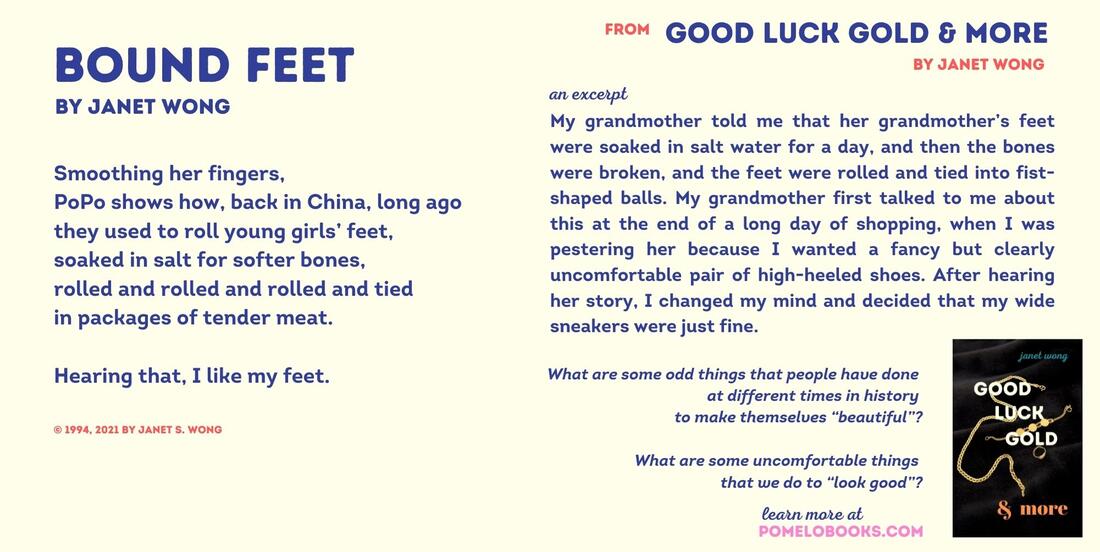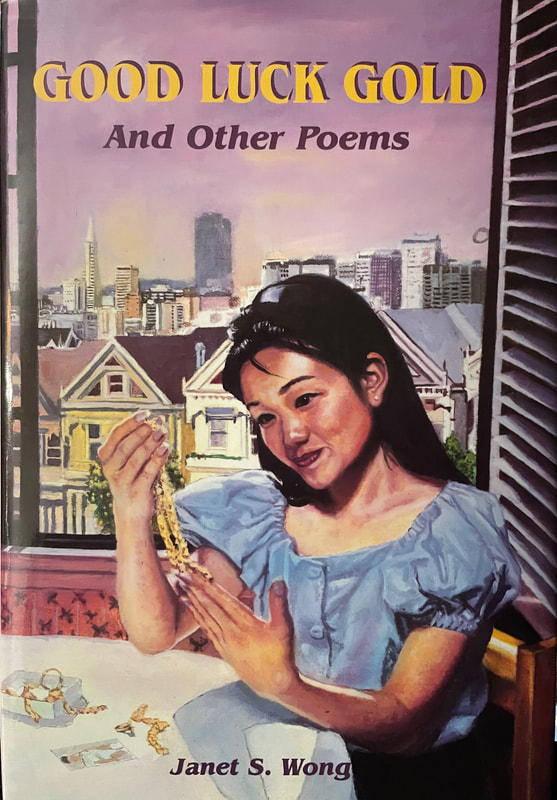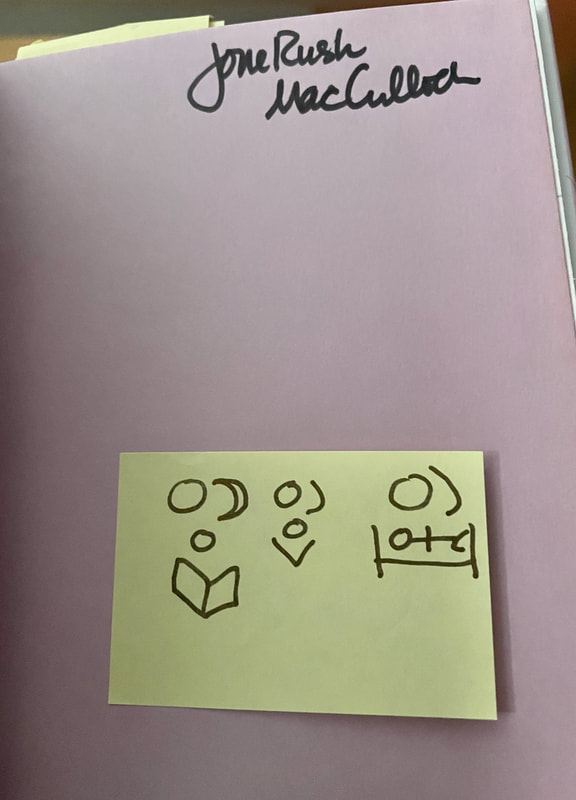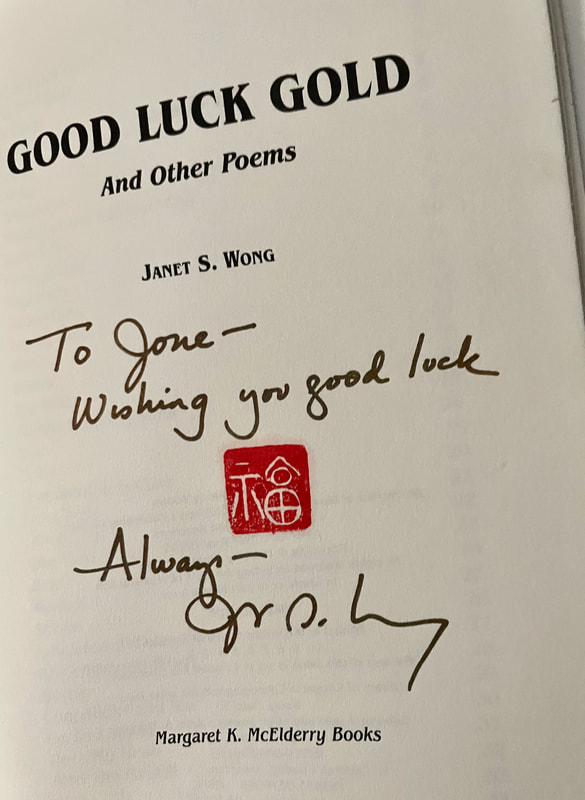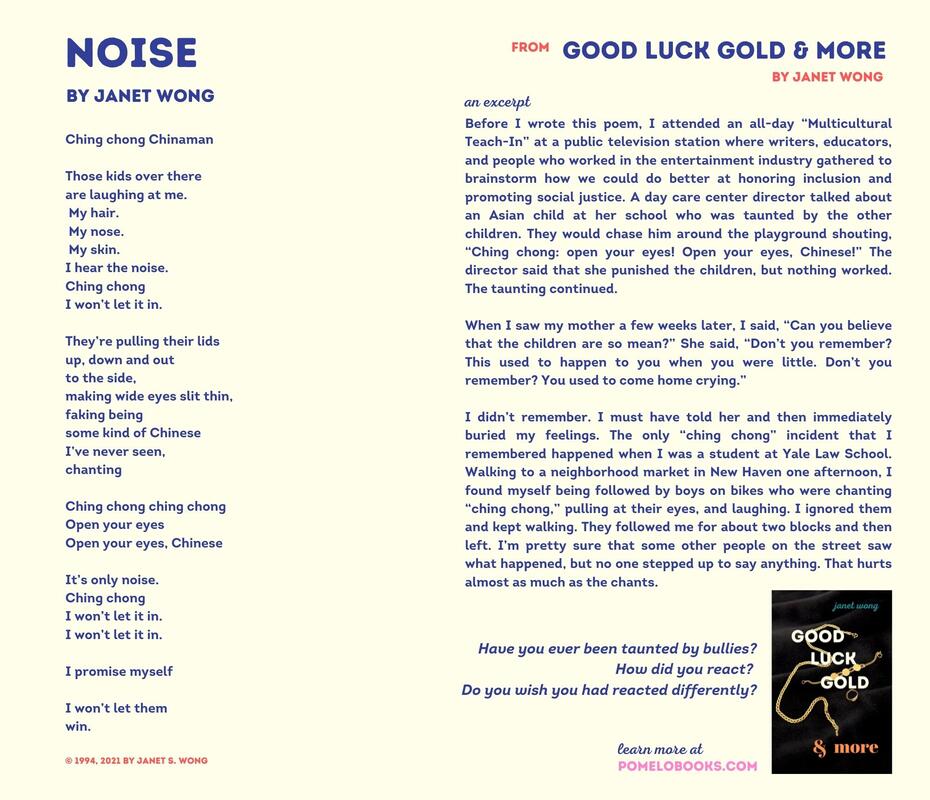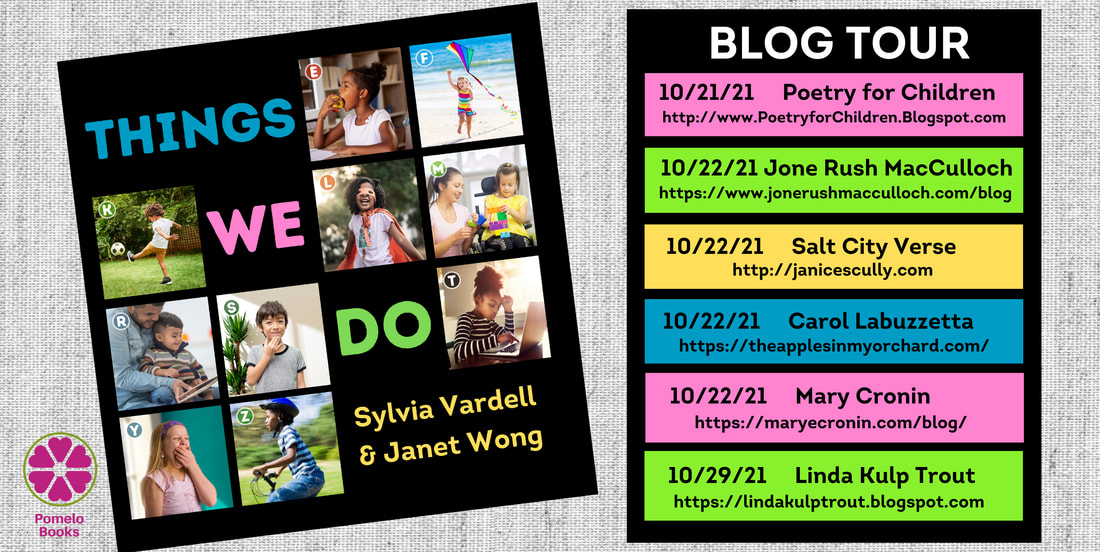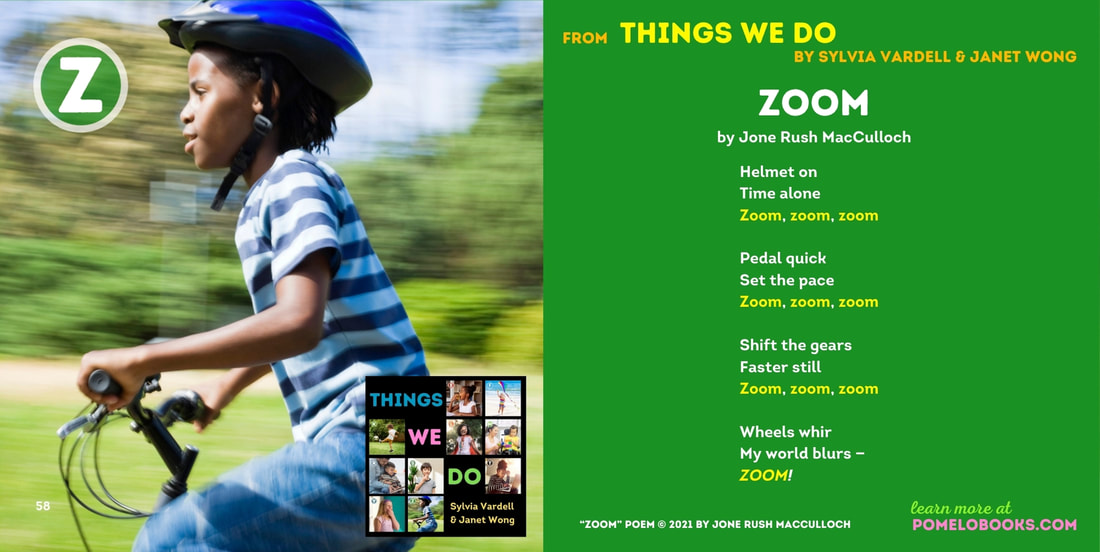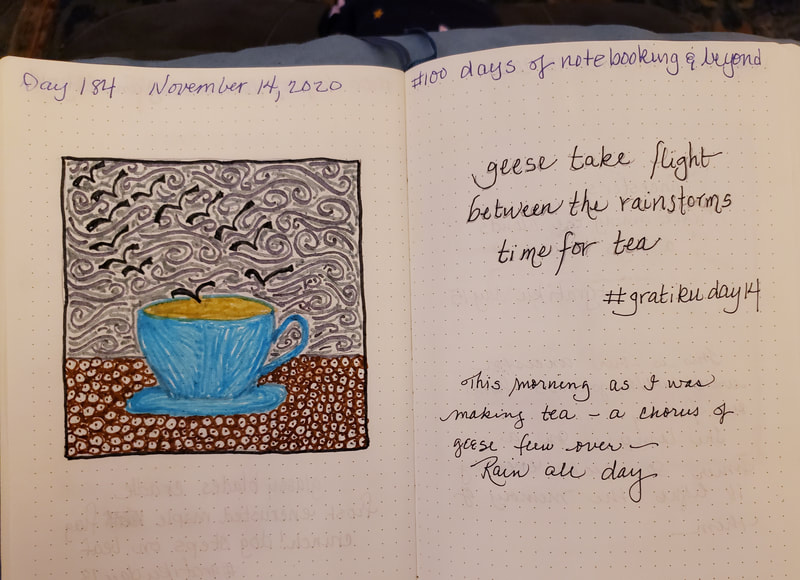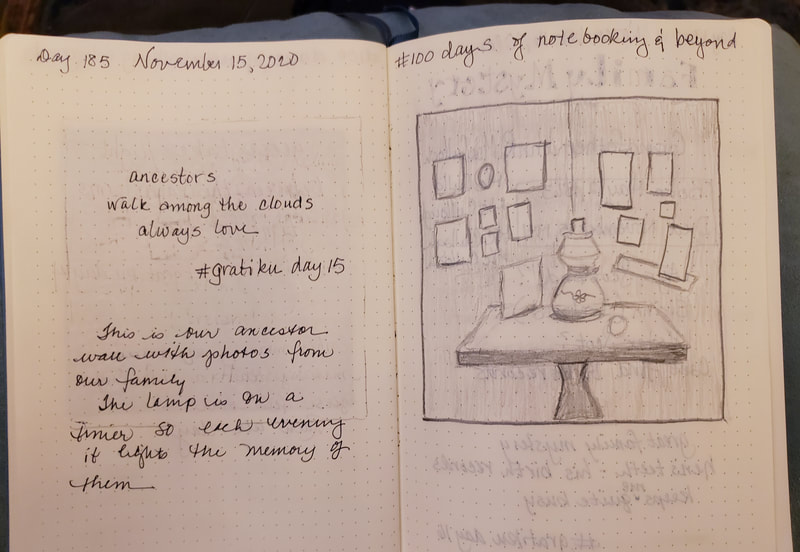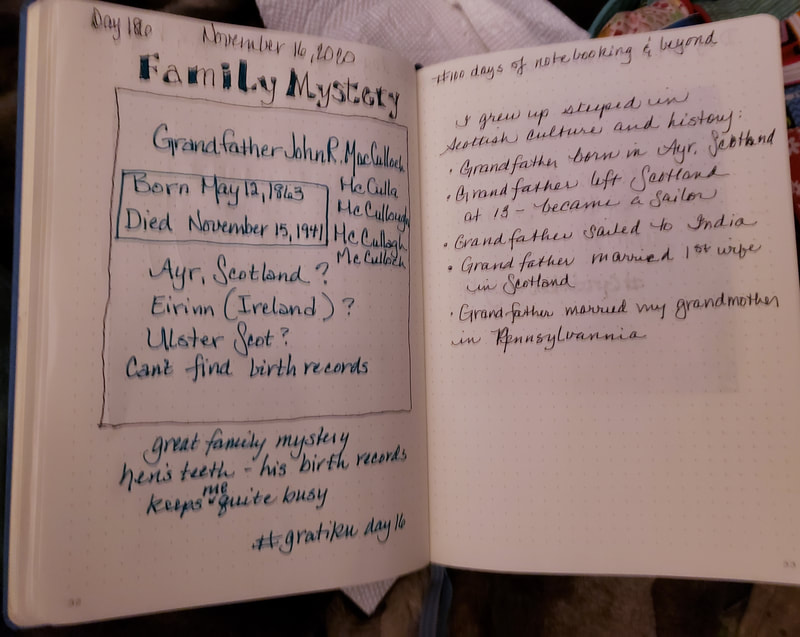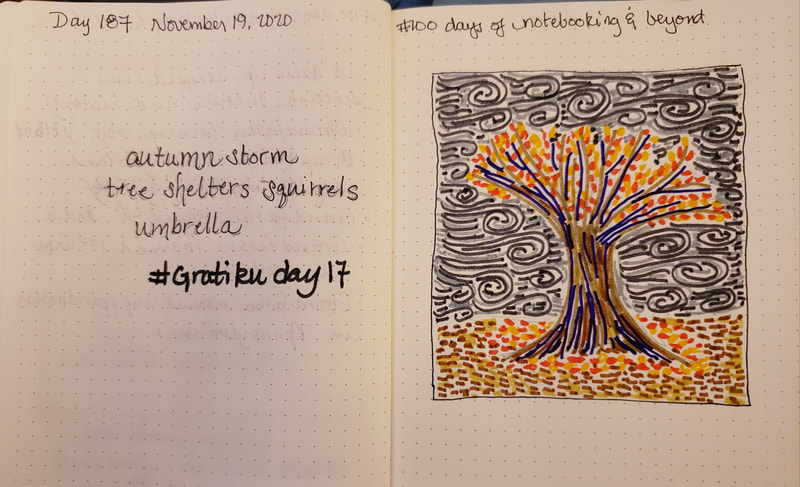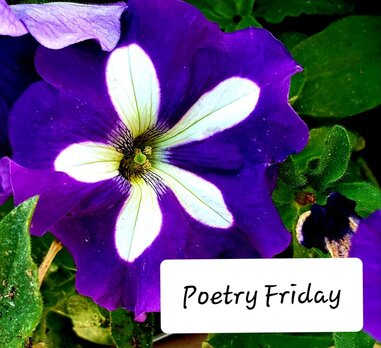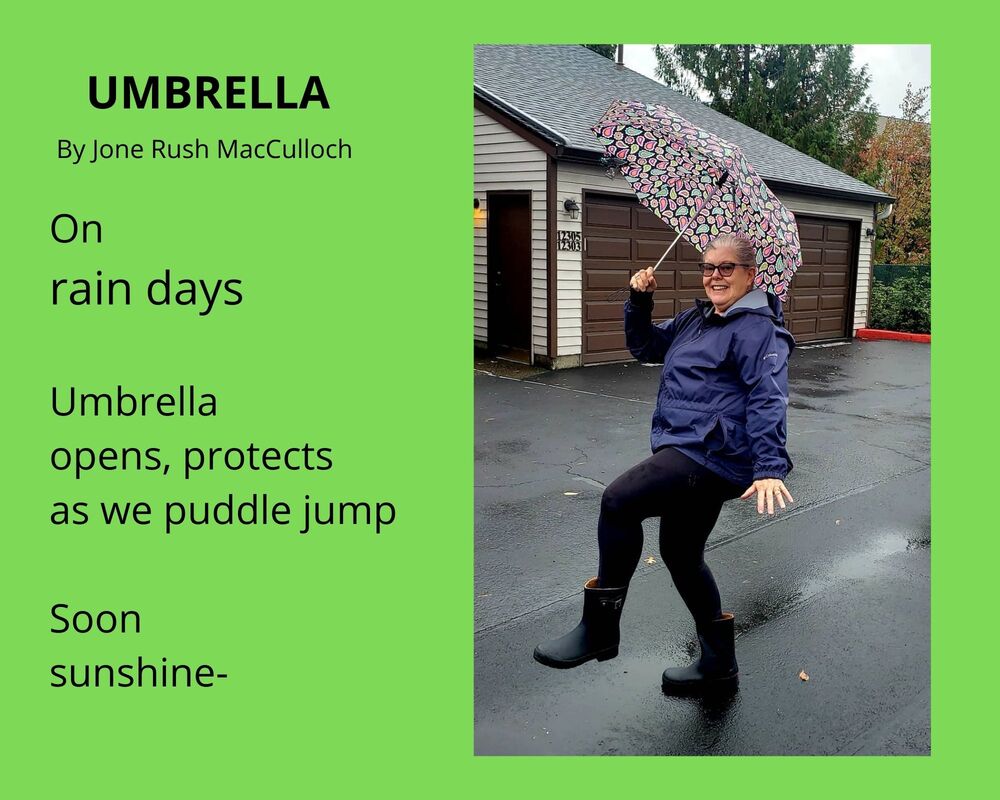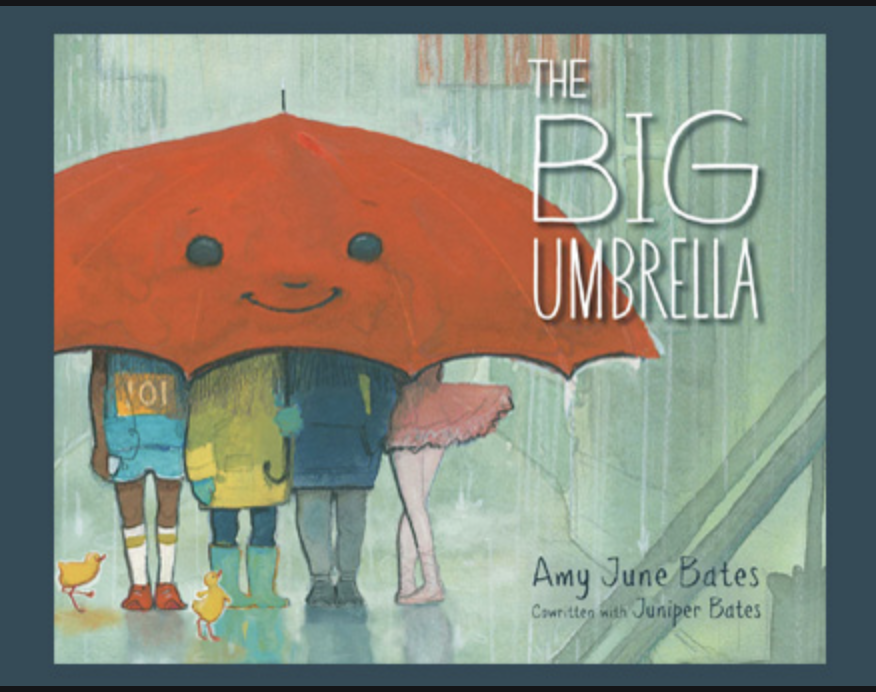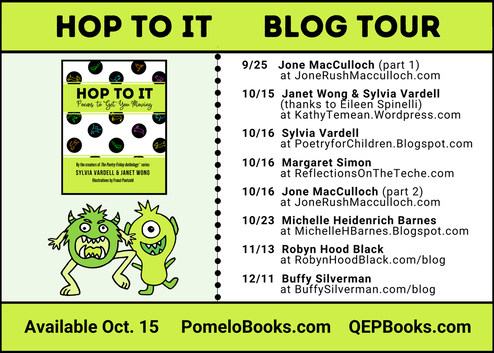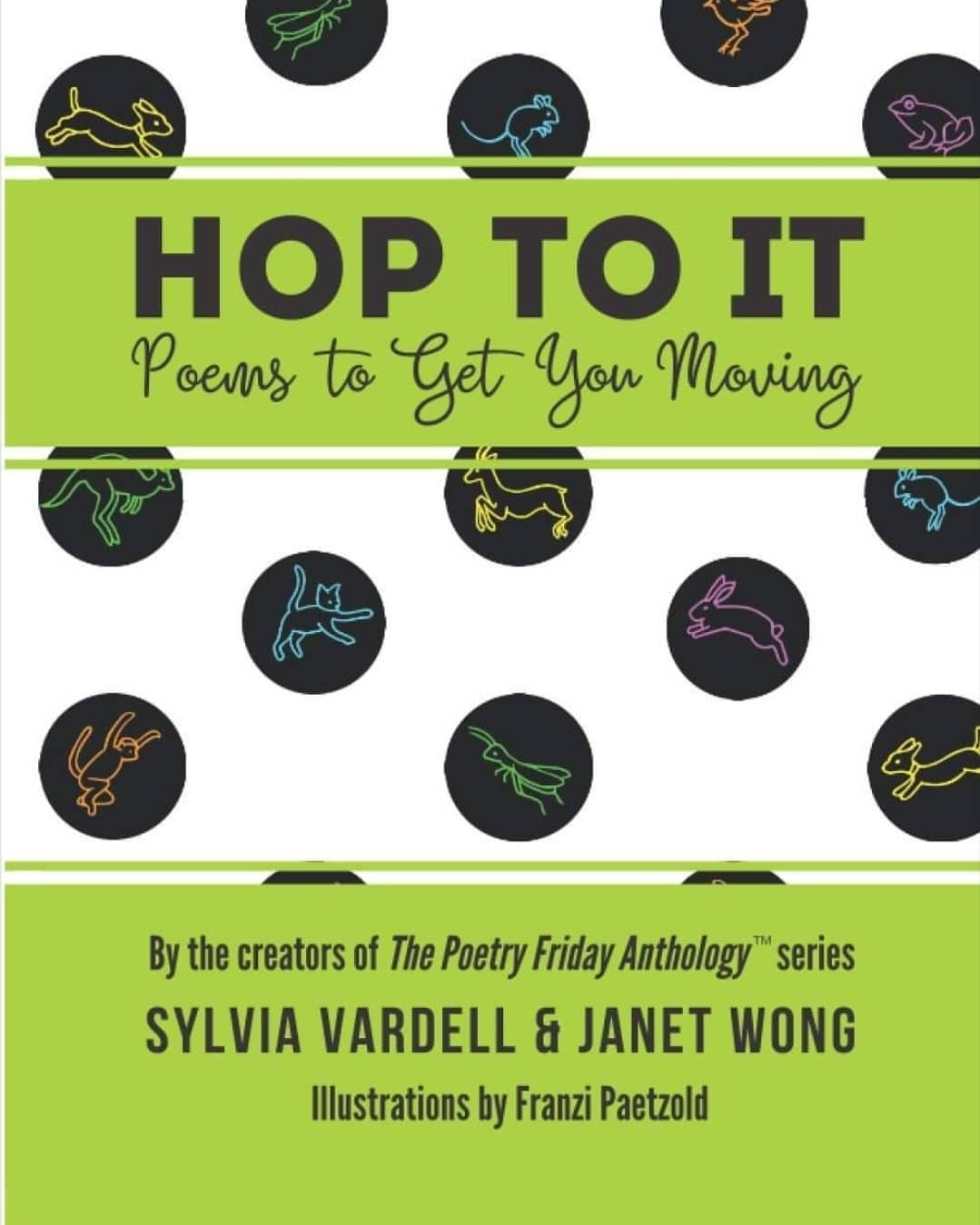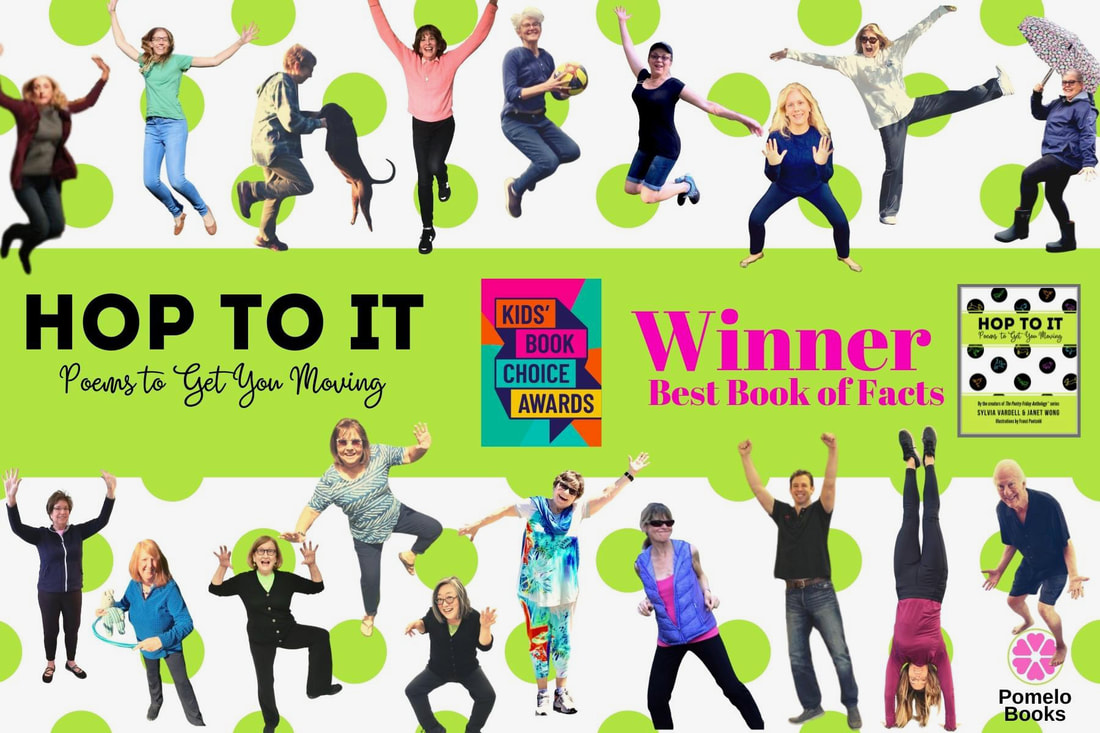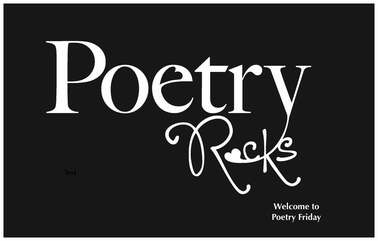 Graphic by ©AmberFleek Graphic by ©AmberFleek Today's Poetry Friday host is Rose at Imagine the Possibilities is sharing the Nevermores" poetry challenge a reverse poem. I am in the middle of Washington state with my longtime college friends (ones I met my freshman year). We have bee gathering for a weekend since 2003. What is Hope? edited by Sylvia Vardell and Janet Wong arrived on August 18, 2023. Sylvia and Janet hosted another fantastic class, Think Poetry this summer. The challenge? Photos for ekphrastic poems on the theme of HOPE. This photo, a visit in a hospital was one that spoke to me. This tanka (five lines; 5-7-5-7-7) arrived with little fuss. What does I-LOVE-YOU look in Morse code?
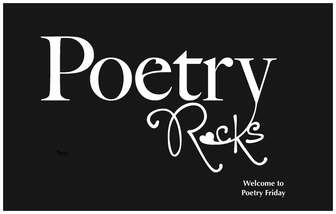 Welcome to Poetry Friday. Thanks to Sarah Grace at Sarah Grace Tuttle is sharing her process with metered verse. Can't wait to read more closely. Poetry Challenge: The Inklings are serving up: Wordy 30 is a poem using exactly 30 letters. Each line should have the same number of letters. Each line should use one word. You might have 6 lines with 5 letters in each line (like Wordle), or 5 x 6, 3 x 10, 10 x 3, 15 x 2, 2 x 15, 30 x 1, or (most unlikely) 1 x 30. I am taking a class with the fabulous Georgia Heard and Rebecca Kai Doltich. What I love about them is the talking about poems and poets plus honoring our work. And with honoring the work are nudges and wonderings to enhance revision. Last week, I had the about actually happen. We keep our back door to the deck ope a lot so our dog, has access to the deck. And we have had numerous finches, sparrows, and juncos fly in. (Admitly, it creeps me out as there's an old wives' tale about birds entering house). Last week it was a hummingbird. It was a moment of wonder. In class, we talked about how this poem was akin to a little play and how to create more drama by cutting words. Today while revising, it occurred to me that there was a better title from some words I cut. I only had titled is "Hummingbird" because I couldn't think of anything else, until today, "Autumn Afternoon". Book News: What Is A Friend? Edited by Sylvia Vardell and Janet Wong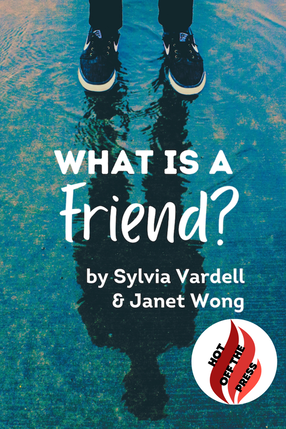 It's here! What is A Friend?, edited by Sylvia Vardell and Janet Wong. The poets in this book submitted poems for consideration. It's a great example of ekphrastic poetry while considering what makes a friend or friendship. It is a Children's Book Council "Hot Off the Press" Selection for October. 100% of the profits will be donated to the IBBY Children in Crisis Fund (IBBY.org). 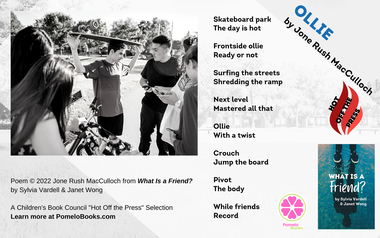 I had fun with this poem. I knew nothing about skateboarding. (Riding a bicycle was difficult enough). The terms came from researching and followed by checking with former students for accuracy. Bonus: I have a great nephew who's name is "Ollie." 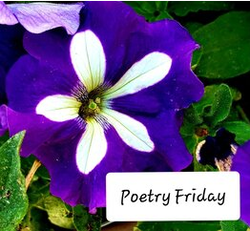
Welcome to Poetry Friday, hosted by Jama at Jama's Alphabet Soup. She has a fabulous post with Mom filled poems and remembering her mom is photos.
I love this: "What we wouldn’t give for just one more sip of our mothers’ unconditional love." Absolutely, Jama. 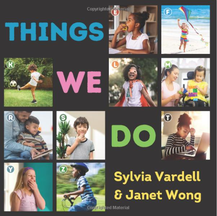
Last Friday, I had the pleasure of subbing in a library and the teacher librarian asked if I would do poetry with the fourth and fifth grade classes. Who's going to turn that down? I've been thinking about ways to use Sylvia Vardell's and Janet Wong's, Things We Do, as mentor text. When you have to teach in a thirty minute class, it's almost like a poetry slam.
I created a quick presentation of four slides, share a couple of poems from the book. (I really love Jack Prelutsky's "Eat"), introduced and guided the students through writing a skinny poem. One thing about these poems is flexibility. Technically, a skinny poem only allows for one word in lines 3, 4,5 and 7, 8, 9 but we flex that rule little. Congrats to Karen Edmisten. She won a copy of Imperfect II. Please email me your address.
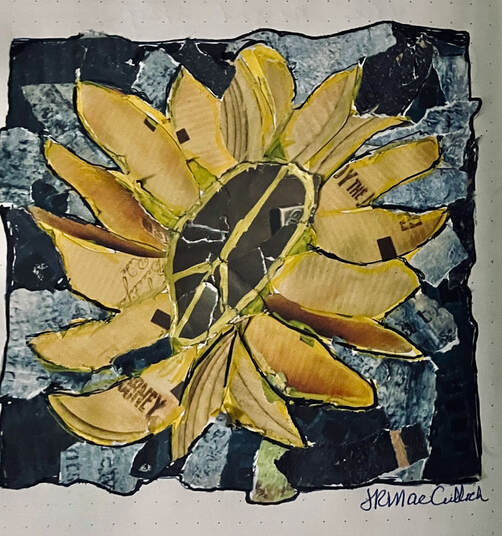 in the night Ukrainian Sunflowers seeds of peace ©2022 Jone Rush MacCulloch 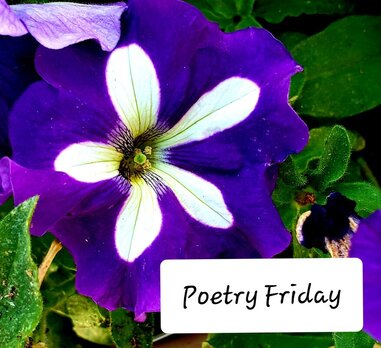
Thanks to Carol at Beyond LiteracyLink for hosting the round up. Her autumn gallery is stunning as usual.
And it's a busy weekend for many who are attending NCTE!
The winners of GOOD LUCK GOLD AND MORE. Lucky winners have books winging their way to them.
Sign up for the 2022 Poetry Postcard Exchange
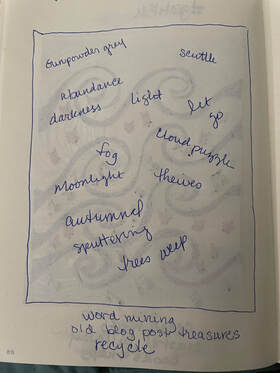
I am thinking about the November challenge to write an ode to November. I went through old posts looking for words.
#gratiku, Day 19. word mining old blog post treasures recycle 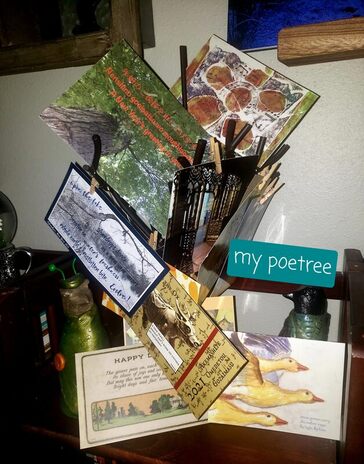
It's time. Sign up for the 2022 New Year Postcard Exchange. Send five, send ten or send to all.
Did you know there are 43 days until 2021 ends? Woohoo! Let's celebrate the New Year with a New Year Postcard? In Japan, it’s called Nengajo, a Japanese custom of ushering in the new year. How It Works:
 Be sure to head to Matt at Radio, Rhythm & Rhyme. He is hosting the Poetry Friday Round Up and celebrating the arrival of Friends & Anemones: Ocean Poems for Children, created by members of The Writer’s Loft in Sherborn, Massachusetts. Do you like challenges? The Poetry Sisters have an invitation: You’re invited to join our challenge for the month of November! We’re writing an Ode to Autumn. An ode is a lyrical poem, a way of marking an occasion with a song. Whether you choose an irregular ode with no set pattern or rhyme, or the ten-line, three-to-five stanza famed by Homer himself, we hope you’ll join us in singing in the season of leaf-fall and pie, and sharing on November 26th in a blog post and/or on social media with the tag #PoetryPals. The #inklings offer this challenge: “Write a poem that includes the idea of percentage or percent. Percentages are all around us in recipes, prices, assessments, statistics. Include the idea of percentage in your poem in some way.” Friends & Anemones: Ocean Poems for Children, created by members of The Writer’s Loft in Sherborn, Massachusetts, was officially published November 8, 2020! 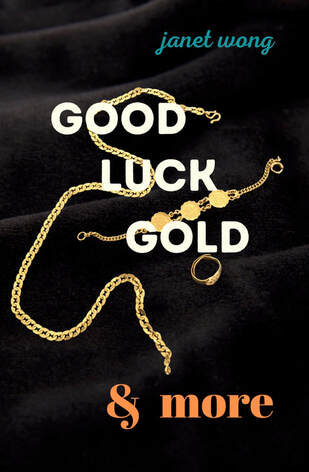 I've been reading GOOD LUCK GOLD and MORE by Janet Wong. This is her re-issue and expanded collection of poems from her DEBUT book in 1994. I have the original book signed by her. I highly recommend this book be in every elementary and middle school for sure. These poems are timeless. I remember reading them twenty-seven years ago and being astonished by the treatment given to the author and now reading them they still give me pause at how some humans treat others. The “story behind the story” or “story after the story” additions are powerful and provide such a good bridge to talk to students about racism. JRM: GOOD LUCK GOLD was your debut book for kids in 1994. What was it like to take a class from Myra Cohn Livingston? JW: Myra Cohn Livingston mentored a whole generation of children’s poets in her Master Class in Poetry. This was a UCLA Extension class that was offered only to those Beginning Class alums who were invited by Myra; there was seldom an opening. As a result, Myra’s Beginning Class was full of students who had taken it five or more times and were not beginners at all: Monica Gunning, Kristine O’Connell George, Joan Bransfield Graham, and more. Some people who took Myra’s classes were published picture book writers who wanted to know more about poetic techniques: Alice Schertle, April Halprin Wayland, Ruth Bornstein, and Tony Johnston, for example. Earlier this year I was invited by Julie Hedlund to speak with the 12x12 group, and I felt like I was channeling Myra with my emphasis on assonance, consonance, and internal rhyme. Myra died in 1996, but you can still learn from her book Poem-Making: Ways to Begin Writing Poetry (now out of print, but you can find it at a library). JRM: And you can also find it at Thrift Books. GOOD LUCK GOLD was written twenty-seven years ago. How has life experiences informed you when writing the new content? JW: Five years ago, I thought that the discussions about anti-Asian racism weren’t really needed any longer. I was content to let the original GOOD LUCK GOLD rest in peace. But the recent surge in anti-Asian racism has scared me. I’m afraid for my 86-year-old father, worried that some crazy racist will attack him on the street. I’m even afraid for myself sometimes; I’ll think twice before walking somewhere alone. Because of all this, I felt an even greater urgency when writing the prose pieces about racism, an immediate need to connect with readers on a basic human level. JRM: I could see this book being a mentor text for students to write their own poems about their parents and grandparents, food, and culture. Have you worked with students to create their own collections? JW: In 2013 I worked with some students from Chadwick School in California to create anthologies—a 6th grade anthology and a 3rd grade anthology where every student was involved somehow: writing, illustrating, editing, copyediting, typing, doing technical work, and even marketing the books that they created, selling them on Amazon to raise funds for charity. I think those students really enjoyed having a “real world” publishing project. If schools want to embark on this kind of project for students in a certain grade or in a publishing club, I know that there are several poets who could provide guidance (for a fee). Jone, YOU would be an ideal poet to help schools make their own books. (Parent volunteers: raise some funds and hire Jone!) JRM: Was there one poem that was more challenging to write? JW: The poem “Bound Feet” went through many, many drafts. The prose piece, too. There is so much that can be said about the complicated history of foot-binding. After trying to write a narrative poem, I finally decided to keep the poem close to my own personal experience, writing about how I felt as a child when my grandmother first told me about her grandmother’s bound feet. When a poet—or any writer, even a writer of nonfiction for adults—is having difficulty with a topic, I think one good approach is to pretend that you are a child again and write from the child’s point of view. JRM: What would you like readers of this interview to know about #StopAsianHate and bystander training?
JW: The Hollaback! bystander training session is free and takes just one hour of your time; you can sign up in a minute at ihollaback.org. There are sessions focused on anti-Asian racism and also on different communities and issues. My main takeaway: as a bystander, we sometimes worry about getting involved because we know that we can’t fix the situation alone. And maybe we’re scared. But you don’t have to resolve the problem all by yourself. Just do something to get things started. You can distract. You can document. You can delay until more help arrives. Be the first bystander to step up, and others will follow. JRM: What is your next project? JW: Sylvia Vardell and I plan to continue with our Anthologies 101 and 201 courses next year, working on books similar to the THINGS WE DO book of ekphrastic poems with your fun poem "ZOOM,” Jone. People can learn more about these workshops at our website here. Next up for the January/February 2022 Anthologies 201 group is THINGS WE EAT, a topic near and dear to my heart (and stomach). One of the photos that Sylvia and I have selected features a Korean restaurant scene and the word "kimchi." I am super excited for that book—you could even say I’m hungry for it! For fun: Sylvia's and Janet's next project is THINGS WE EAT. What would be a food for the letter X? Comment below. Janet is generously sending 6 books to people who comment (3 from last week and 3 this week) I will announce the winners next FRIDAY, NOVEMBER 19. Thank you, Janet for providing readers with great back story about GOOD LUCK GOLD and More. Looking forward to the next books that you write.  Thanks to Mary Lee Hahn for hosting the Poetry Friday Community this week. Her post is up and includes the Inklings challege for November: “Write a poem that includes the idea of percentage or percent. Percentages are all around us in recipes, prices, assessments, statistics. Include the idea of percentage in your poem in some way.” Thanks, Linda Mitchell for the idea. #inklings Do you like challenges? The Poetry Sisters have an invitation: You’re invited to join our challenge for the month of November! We’re writing an Ode to Autumn. An ode is a lyrical poem, a way of marking an occasion with a song. Whether you choose an irregular ode with no set pattern or rhyme, or the ten-line, three-to-five stanza famed by Homer himself, we hope you’ll join us in singing in the season of leaf-fall and pie, and sharing on November 26th in a blog post and/or on social media with the tag #PoetryPals.  I've been reading GOOD LUCK GOLD and MORE by Janet Wong. This is her re-issue and expanded collection of poems from her DEBUT book in 1994. I have the original book signed by her. I highly recommend this book be in every elementary and middle school for sure. These poems are timeless. I remember reading them twenty-seven years ago and being astonished by the treatment given to the author and now reading them they still give me pause at how some humans treat others. The “story behind the story” or “story after the story” additions are powerful and provide such a good bridge to talk to students about racism. In preparing for this blog post and next week's post, she and I put together that I attended a joint library conference for Oregon and Washington in the late 1990's. At the time, Janet used a chop with the ancient Chinese pictogram for good luck (not the contemporary Chinese character). Janet would encourage people to make their own pictogram showing what their personal vision of good luck (or a lucky day) would be. Mine lucky day would be reading all day (sun + moon + head + book). She drew two versions of a book, traditional and simplified. I must have also said that being able to nap outside was another lucky day. (sun + moon + head and body in bed). JRM:What were your favorite books as a child? How aware were you that books about Asian characters weren’t available? (I’m thinking how there are students I know that would love to read this book and see themselves in it. I remember getting it for the library when it first came out) JW: I was totally oblivious to the lack of Asian faces in the books I read—but part of that was likely because, as a very young child, most of my favorite books featured animals. The Story of Bubbles the Whale was my tip-top favorite; I had fallen in love with the pilot whale Bubbles on trips to Marineland. When we talk about diversity and inclusion and children being able to “see themselves” in a book, I worry that we sometimes think too restrictively. If anyone had pressed me to talk about it, I would’ve identified as much as a “Bubbles fan” as I did as an Asian American. That being said, if there had been a book featuring Bubbles AND a short, plump Asian American girl who loved watching TV and eating shrimp chips, that would’ve been PERFECT. JRM: Wow, I remember Marineland and I was a tiny bit sad to learn it no longer exists recently. GOOD LUCK GOLD was your debut book for kids in 1994. What was it like to take a class from Myra Cohn Livingston? JW: Myra Cohn Livingston mentored a whole generation of children’s poets in her Master Class in Poetry. This was a UCLA Extension class that was offered only to those Beginning Class alums who were invited by Myra; there was seldom an opening. As a result, Myra’s Beginning Class was full of students who had taken it five or more times and were not beginners at all: Monica Gunning, Kristine O’Connell George, Joan Bransfield Graham, and more. Some people who took Myra’s classes were published picture book writers who wanted to know more about poetic techniques: Alice Schertle, April Halprin Wayland, Ruth Bornstein, and Tony Johnston, for example. Earlier this year I was invited by Julie Hedlund to speak with the 12x12 group, and I felt like I was channeling Myra with my emphasis on assonance, consonance, and internal rhyme. Myra died in 1996, but you can still learn from her book Poem-Making: Ways to Begin Writing Poetry (now out of print, but you can find it at a library). JRM: How long did it take to write the forty-two “story behind the story” or “story after the story”? Did you go back through old journals and notes to write the new additions? JW: It took about six months. It was a difficult project because several of the poems are about unpleasant topics such as racism and bullying. It was really important that the prose pieces and writing prompts were engaging enough to draw the reader in. I hope this book helps families and teachers and librarians to get kids talking about important issues—and working toward change. JRM: What surprised you when you were writing the additional content? JW: I was surprised by how vividly I remembered details from some things that happened when I was in my 20s. I still remember the “ching chong Chinaman” taunting from when I was in law school as clearly as if it happened last week. And yet I had blocked out my childhood memories of those similar incidents. JW: Sylvia Vardell and I plan to continue with our Anthologies 101 and 201 courses next year, working on books similar to the THINGS WE DO book of ekphrastic poems with your fun poem "ZOOM,” Jone. People can learn more about these workshops at our website here. [link: https://pomelobooks.com/anthologies-101] Next up for the January/February 2022 Anthologies 201 group is THINGS WE EAT, a topic near and dear to my heart (and stomach). One of the photos that Sylvia and I have selected features a Korean restaurant scene and the word "kimchi." I am super excited for that book—you could even say I’m hungry for it! JRM: Ooh, I love this idea. Food is such a great topic to write about. I did that as a topic for National Poetry Month in 2020. Next week, I will have the second half of Janet Wong's interview. I'll be sharing about why 100% of the proceeds of the book will going to #StopAsianHate and bystander training. BONUS: Janet is offering six books for prizes. Three this week and three next week. Comment on this blog post. Win a copy of GOOD LUCK GOLD and MORE. Janet will generously send one to the winners. Good Luck!  This week, Jama at Jama's Alphabet Soup is hosting our weekly poetic potluck. She's sharing a fabulous October poem and her always drool-worthy food photos. THINGS WE DO, Edited by Sylvia Vardell and Janet Wong Zooms into the WorldI am thrilled to announce the arrival of THINGS WE DO, edited by Sylvia Vardell and Janet Wong into the world on October 21, 2021. And I am fortunate to have a poem chosen. A little backstory: In August, I took a workshop with Syliva and Janet about putting together anthologies. There was a lot of interest in more in depth learning about creating an anthology. That’s when the brilliant Janet and Sylvia came up with a follow up workshop with a goal, an opportunity to create a fundraiser for the IBBY Children in Crisis Fund. "More and more clearly, I came to realize that I must not look backward, but to the future ~Jella Lepman, Founder of IBBY Those in the class were tasked to submit three Ekphrastic poems based on things we do, a perfect PreK themed book. From there, feedback was given and Sylvia and Janet selected the poems to represent the different activities. I will be the first to admit that writing to a prompt is a challenge. The prompt pushed me to play and just submit. Thanks to Janet’s and Sylvia’s feedback and direction, my poem “Zoom” was selected. Please "zoom" over to the link below to purchase this new title. All proceeds are going to IBBY Children in Crisis Fund, a fund that provides support to children whose lives have been disrupted through war, civil disorder or natural disaster. In addition to THINGS WE DO, Janet’s book GOOD LUCK GOLD AND MORE were both selected as "Hot Off the Press" books for October by the Children's Book Council. I will be interviewing Janet on her new book on Friday, November 5, 2021. Other Helpful LinksUSBBY: Donate
Note: we'll be donating 100% of our profits to the IBBY Children in Crisis Fun via USBBY, and we'd love it if people joined USBBY and started supporting USBBY and IBBY's causes on their own. QEP Books: Things We Do - Coming 10/21/2021 Note: QEP Books is a small company that specializes in books for teachers. They charge for shipping; I think it's $5 per order, but it might be more. They do provide books at a discount, so if you buy 3-4 books, your savings will pay for shipping.
#gratiku day 14
geese take flight between rainstorms time for tea #gratiku day 15 ancestors walk among the clouds remembrance #gratiku day 16 great family mystery his birth records- hen's teeth down the rabbit hole #gratiku day 17 autumn storm tree shelters squirrels umbrella "Umbrella" video from HOP TO IT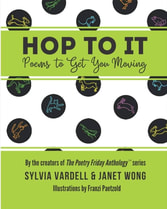
Yesterday's haiku reminded me
of the "Umbrella" video for my poem. Sylvia Vardell created on a recent zoom party for HOP IT IT. Janet Wong and Sylvia Vardell always create magic with their books. You can order your copy at QEP Books via phone 800-323-6787 and email: [email protected] Let's Welcome 2021 with a Poetry Postcard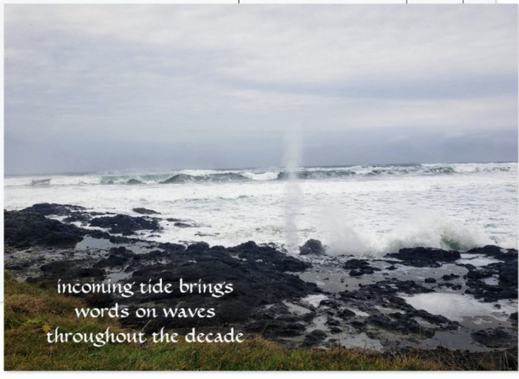
Did you know there are 42 days until 2020 ends? Woohoo! Let's celebrate the New Year with a New Year Postcard? In Japan, it’s called Nengajo, a Japanese custom of ushering in the new year.
How It Works:
All poetry goodness can be found at
Teacher Dance. Thanks Linda! There is a lot of goodness to be had in the Poetry Friday community today. Please visit Janice at Salt City Verse for more places to read poetry. I will get right to it. Yesterday was the official book birthday of HOP TO IT: Poems to Get You Moving, edited by Janet Wong and Sylvia Vardell. It features 100 poem by 90 poets that will make you wiggle your hands and toes, hop, skip, stretch, and jump in puddles. The Children’s Book Council (CBC) selects a small number of new releases to highlight on their “Hot Off the Press” page ever month. This month, they chose HOP TO IT. What an honor. Lucky me to have my poem, "Umbrella" in the collection. Living in the Pacific Northwest, there's plenty of rain and puddles for jumping, I've always been that person. Janet Wong and Sylvia Vardell create books that are treasure troves for anyone sharing poetry with kids. In HOP TO IT, each poem is paired with a book. This is something I did when I taught poems and books, they make a lovely paring. So I am thrilled that The Big Umbrella by Amy June Bates and Juniper Bates was selected to be with my poem.
|
AuthorAll photos and poems in these blog posts are copyrighted to Jone Rush MacCulloch 2006- Present. Please do not copy, reprint or reproduce without written permission from me. Categories
All
Archives
July 2024
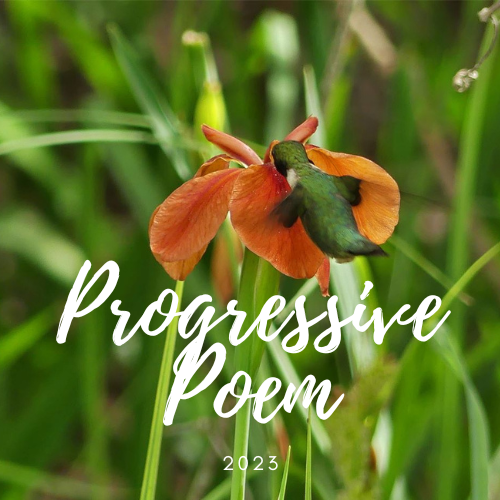
2023 Progressive Poem
April 1 Mary Lee Hahn, Another Year of Reading April 2 Heidi Mordhorst, My Juicy Little Universe April 3 Tabatha, The Opposite of Indifference April 4 Buffy Silverman April 5 Rose Cappelli, Imagine the Possibilities April 6 Donna Smith, Mainely Write April 7 Margaret Simon, Reflections on the Teche April 8 Leigh Anne, A Day in the Life April 9 Linda Mitchell, A Word Edgewise April 10 Denise Krebs, Dare to Care April 11 Emma Roller, Penguins and Poems April 12 Dave Roller, Leap Of Dave April 13 Irene Latham Live You Poem April 14 Janice Scully, Salt City Verse April 15 Jone Rush MacCulloch April 16 Linda Baie, TeacherDance April 17 Carol Varsalona, Beyond Literacy Link April 18 Marcie Atkins April 19 Carol Labuzzetta at The Apples in My Orchard April 20 Cathy Hutter, Poeturescapes April 21 Sarah Grace Tuttle, Sarah Grace Tuttle’s Blog, April 22 Marilyn Garcia April 23 Catherine, Reading to the Core April 24 Janet Fagal, hosted by Tabatha, The Opposite of Indifference April 25 Ruth, There is no Such Thing as a God-Forsaken Town April 26 Patricia J. Franz, Reverie April 27 Theresa Gaughan, Theresa’s Teaching Tidbits April 28 Karin Fisher-Golton, Still in Awe Blog April 29 Karen Eastlund, Karen’s Got a Blog April 30 Michelle Kogan Illustration, Painting, and Writing |
